You Should Write Unnerving Stories
Exploring the film "Midnight Cowboy" and challenging what is "acceptable"
OBA Media is grateful to be able to partner with the wonderful and amazing Kc MCclary to show you why the world needs your story to be just the way it is—honest, real, unapologetically YOU. The article that they wrote for you today uses the film Midnight Cowboy to show us what can happen when you refuse to let what is “acceptable” to the world dictate the story you tell. If you need help knowing how to share an especially raw story, please feel free to reach out the story coach team at One Brilliant Arc (OBA). We are here to help get stories that matter out into the world!
Exploring Midnight Cowboy
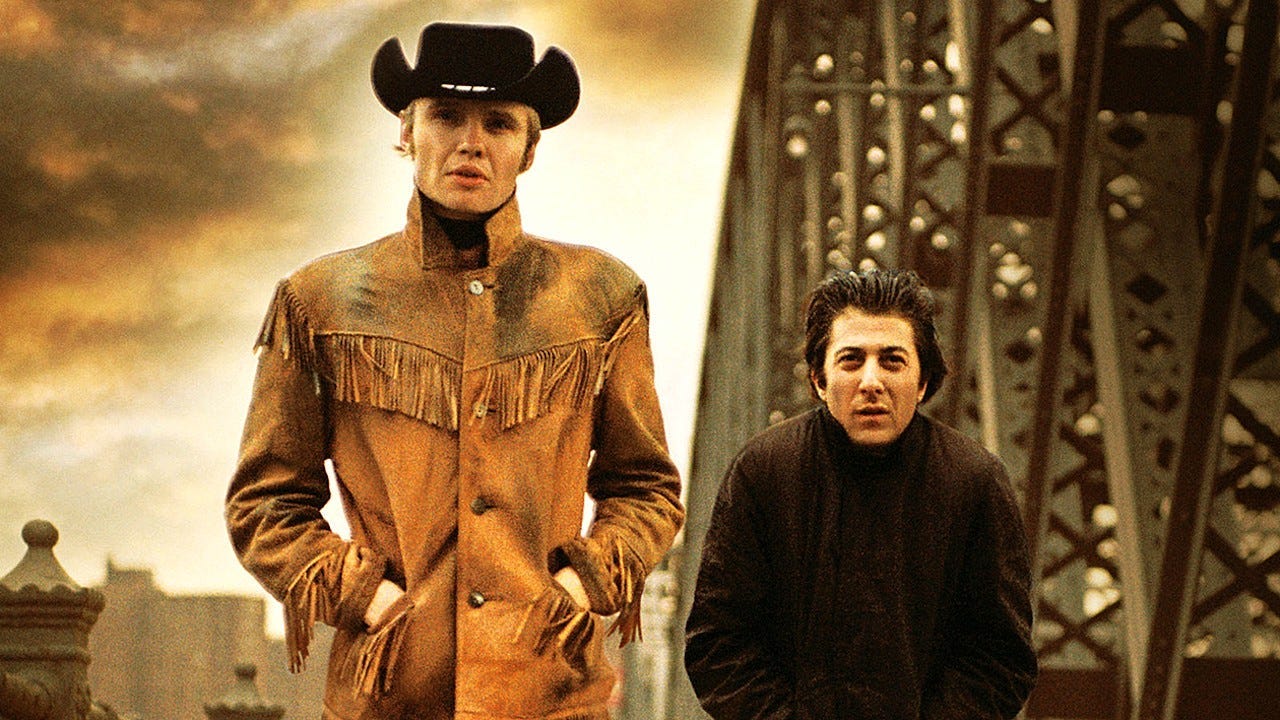
When Midnight Cowboy premiered in 1969, it shattered conventions, challenged Hollywood’s glossy storytelling, and redefined what a Best Picture winner could be. Directed by John Schlesinger and starring Jon Voight and Dustin Hoffman, the film is raw, unfiltered, and deeply human. It paints an unvarnished portrait of urban isolation, desperation, and the pursuit of the American Dream—revealing that, for many people, it is little more than an illusion.
The Story: A Dream Turned Nightmare
Joe Buck (Jon Voight) leaves a dead-end town in Texas and a menial job in a diner for New York City dressed like a gun-slinging cowboy straight out of Red Dead Redemption, believing that his charm and rugged looks are all he needs to find major success as a gigolo for a clientele of wealthy older women.
But beneath his confident facade lies a deep insecurity and unhealed trauma. Joe is undoubtedly shaped by a troubled past. This may have included sexual abuse at the hands of his grandmother, possible jail time done for a false rape, and time served in Vietnam which likely stunted him mentally and emotionally. Naturally, this leads him to daydream and develop an immense misunderstanding of the world he enters into. Joe quickly learns that the streets of New York are not paved with gold but rather with loneliness, exploitation, and total indifference.
Enter Enrico "Ratso" Rizzo (Dustin Hoffman), a sickly, streetwise con man who first deceives Joe but later becomes his only real companion. The two form an unlikely friendship, bound by shared struggles and an outcast status. As Ratso’s health gradually begins to fail and Joe’s desperation grows, they hatch a plan to escape to sunny Florida, dreaming of a much better outcome and an opportunity to make both their names and fortunes. But fate, as always, had other plans.
Breaking Hollywood Conventions
When it originally came out, Midnight Cowboy was the first—and still is the only—X-rated film to win the Academy Award for Best Picture. Its explicit themes, including poverty, homosexuality, and prostitution, pushed the boundaries of what mainstream cinema could depict. The film’s grimy, almost documentary-style depiction of New York City was a stark contrast to the polished, glamorous images audiences were accustomed to seeing in those days.
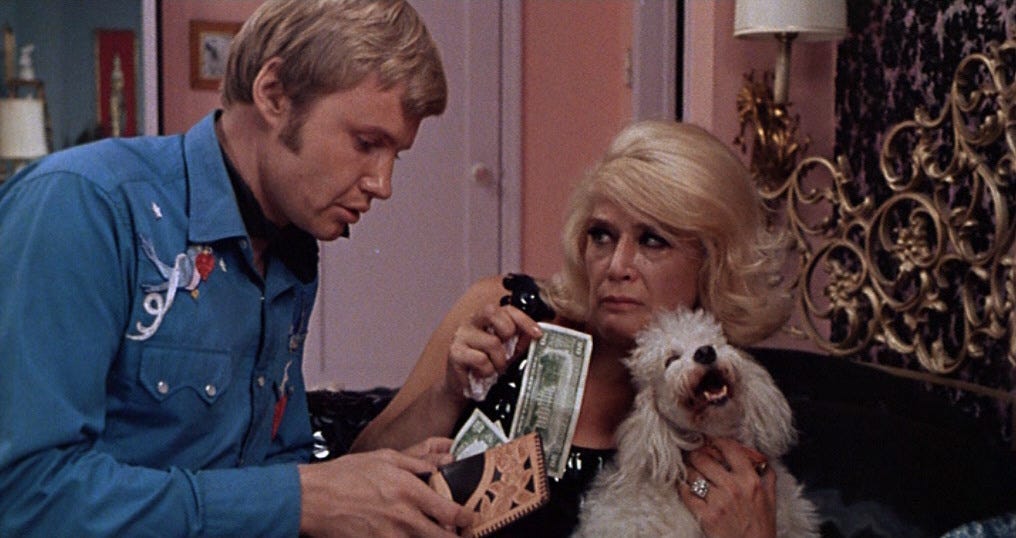
Schlesinger’s direction was bold, using surreal dream sequences, disorienting flashbacks, and cinéma vérité-style cinematography to capture Joe’s fractured psyche. The film’s use of sound was equally groundbreaking, with Harry Nilsson’s haunting cover of “Everybody’s Talkin’” serving as a melancholic anthem for the lost souls wandering through the Big Apple.
Joe and Ratso: Two Sides of the Same Coin
At the heart of Midnight Cowboy is the heartwarming and strangely wholesome relationship between Joe and Ratso. Both men are sadly uneducated, struggle to care for themselves on the most basic levels & are ultimately failed dreamers. Joe clings to a fantasy of success while Ratso dreams of escaping his crippled existence. Their bond is one of primal necessity, yet it becomes something much deeper: a rare, genuine connection in a world that has turned its back on them.
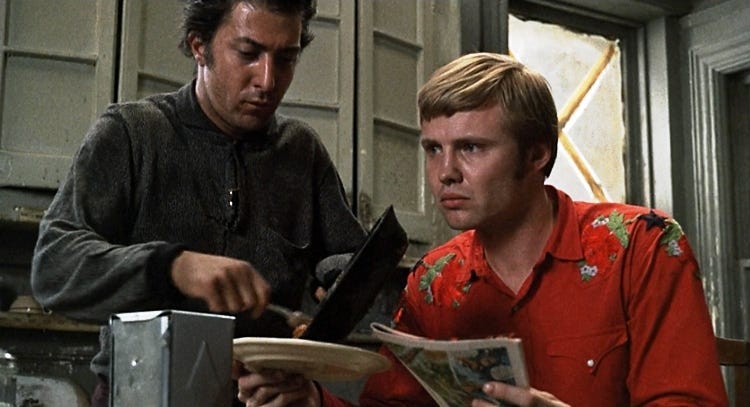
Voight and Hoffman deliver career-defining performances. Voight embodies Joe’s naivety and slow disillusionment with heartbreaking authenticity, while Hoffman transforms Ratso into a tragic, complex figure, far removed from the slick confidence of The Graduate’s Benjamin Braddock.
The Legacy of Midnight
More than 50 years later, Midnight Cowboy remains one of the most powerful and enduring films of the late 1960s. It paved the way for the gritty, character-driven films of the 1970s, influencing directors like Martin Scorsese and Francis Ford Coppola.
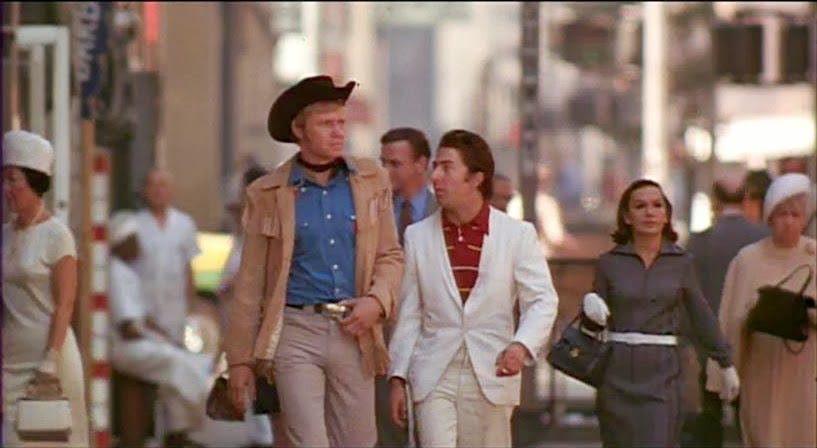
Its themes—urban alienation, shattered dreams, and the desperate need for human connection—are as relevant today as they were in 1969. The film’s final moments, with Joe cradling a lifeless Ratso on a Florida-bound bus, remain one of the most devastating and poignant endings in cinema history.
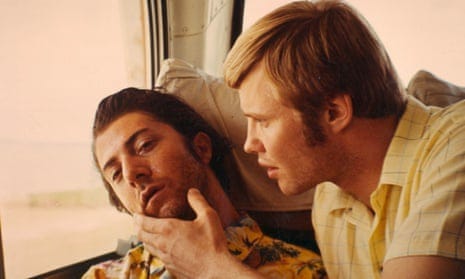
There’s a quiet lie we’re often told that safety guarantees a level-up. Stick to the script. Don’t ruffle feathers. Conform, don't change the channel, be agreeable, always do what’s expected. But Midnight Cowboy — a film about two down-and-out men hustling for survival in a city that doesn’t care if they live or die — did the exact opposite. And it won Best Picture. That’s more than just a cinematic achievement. It’s a life lesson.
This film didn’t ask for approval. It told a story most people would have avoided. It centered characters no one wanted to see. It was ugly, haunting, and human. And it didn’t apologize for any of it. In doing so, it didn’t just reflect the harsher realities of day-to-day life— it redefined what was possible for art during its time.
The truth is, doing something different — whether in your work, your identity, or your choices — feels dangerous because it is. But there’s a difference between danger and failure. Midnight Cowboy teaches us that discomfort isn’t a sign to stop. It’s often a sign you’re getting close to something real: the paradise we discover only after going through hell.
Want to know how YOU can write a bold story that turns the world on its head? OBA Media’s professional editors and story coaches are here to help you do just that! You bring the vision, we’ll be your partners to bring your story to life.
So, whether you’re starting fresh, changing careers, leaving a toxic place, or trying to live free on your own terms, remember this: no one ever made history by playing it safe and avoiding risks at all costs. You don’t need to be flawless, polished, or loved by everyone you ever come across. You just need to be honest with yourself at all times. Boldness, not safety, is what leaves a mark on the world, and friction is what generates heat.
In the end, this isn’t just a film about shattered dreams—it’s a film about survival in a world that is ice-cold and savage. It is a reminder that even in the darkest alleys of existence, there is always room for friendship, for nurturing genuine connections, and for the simple hope of a brighter day.
I rate Midnight Cowboy a strong 8 / 10 Diamonds with a Dragon’s Kiss of Fire 💎💎💎💎💎💎💎💎 🔥🐉 (For a Movie Marathon this film also pairs nicely with Buffalo 66, Taxi Driver, Only God Forgives, Good Time, Uncut Gems, Goodwill Hunting, The Boiler Room, Rounders, Drive, Summer of Sam (1999), The Talented Mr. Ripley, A Score to Settle, Jungle Land, & Red Rocket.)
📰 If you’re looking for exclusive content, be sure to subscribe to my Substack newsletter! It’s packed with a variety of pieces Writing tips, personal stories, social commentary, Art analysis, & True Crime. Join the community and stay in the loop—consider subscribing. 🙂⬇️




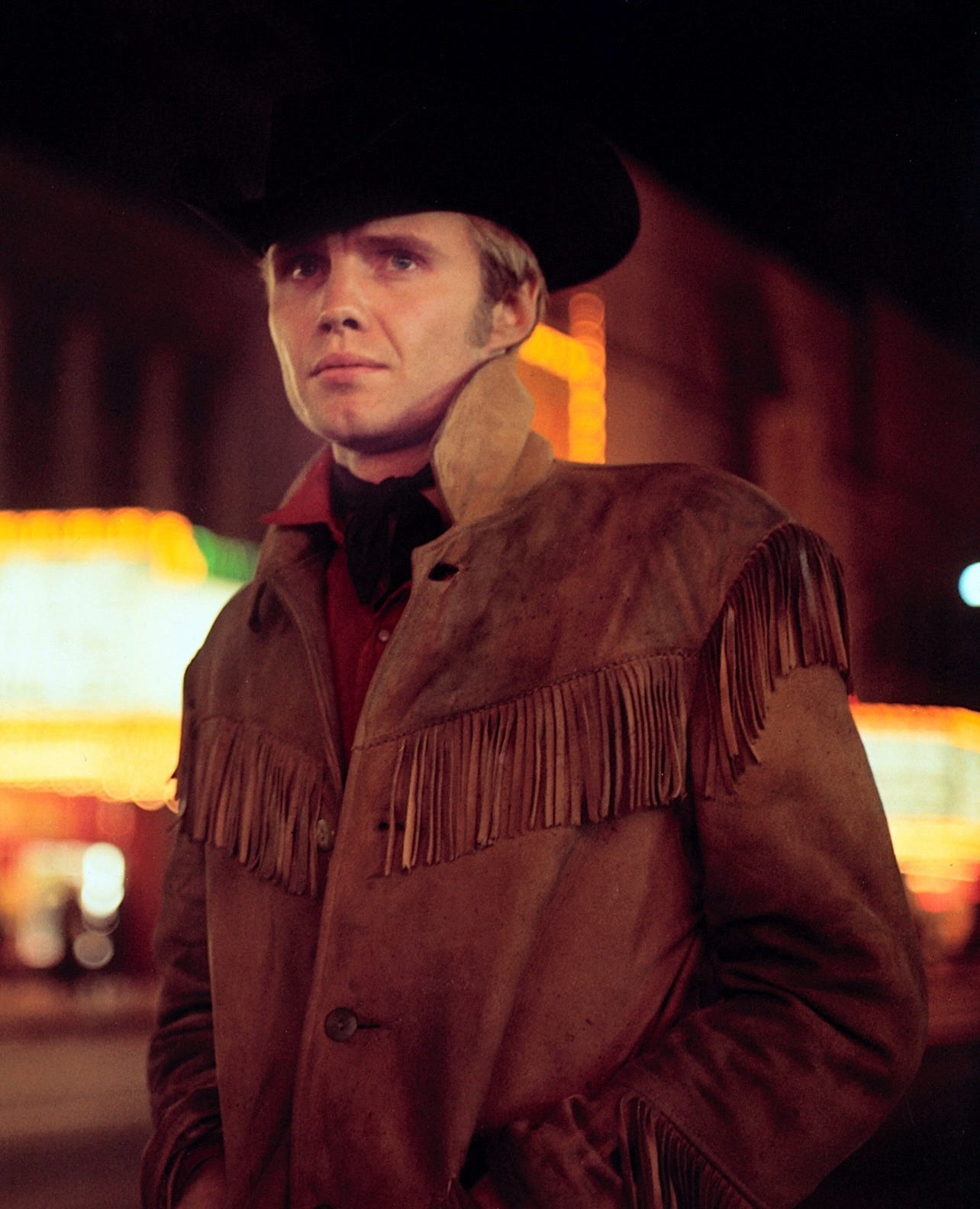


Discomfort isn't failure, and friction often signals you're brushing up against something real. That hit deep. We need more conversations like this—ones that push us to stop waiting for permission and start aligning with who we are and what we ought to do in the world.